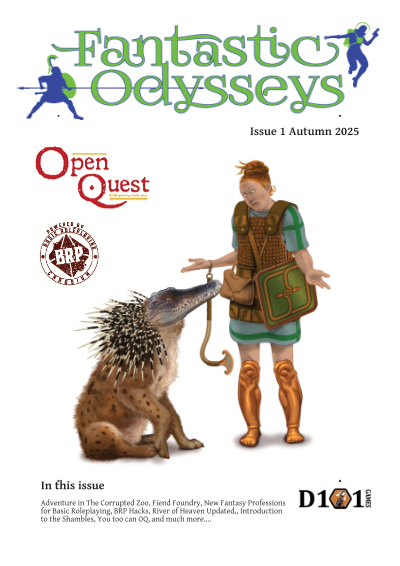This is a boxed commentary for a Basic Roleplaying (BRP) adventure that I’m publishing in the first issue of Fantastic Odyssseys (eta: soon). It applies equally to other D100 Fantasy roleplaying games. It’s a bit ranty because I always get people saying that BRP fantasy games are just like D&D but with percentile skills. I think there’s a bit more to it than that 😉
If you are new to BRP and are using this to introduce yourself and your players to the system, bear the following in mind.
Roleplaying, backed up by skill and characteristic rolls, is important. Making alliances with non-player characters is important, and as well as gaining allies to help them in any big fight, is how the characters learn more about the backstory of Beacon Hill.
Characters are vulnerable. Even if you are using the optional Fate points system a lucky critical hit can easily take down even the most protected character. Encourage the players to think tactically, even if resorting to violence.
While violence is an option, some players will decide to play it overly cautious, even running away from confronting Yiddris and his undead cronies. This is acceptable, and successful completion of the adventure does not require the players to kill all the monsters and take their stuff. The write up even allows for this, giving multiple possible endings (see page xx).
Monsters are People too. The whole adventure twists on this. That the actual villains of the piece are the humans, and one sanctioned by the state carrying Royal Permits of Monster Hunting no less, who have disturbed the peaceful slumber of eternity of King Yiddris. And Yiddris is not merely a bunch of numbers, he’s got his motives and plans that depending on the player’s interactions with him will drive the adventure in one way or another (see Returning to Little Messing page xx).
More the characters do the more they will grow. The more the players push it and do things that trigger skill rolls, the more opportunities for character advancement via skill experience rolls at the end of the adventure.
Information management is a key area of focus for the GM. If the players dig and their characters successfully make the relevant Knowledge skill or Idea rolls, they will uncover more information than if they rely solely on surface-level first impressions. The GM should make them work for anything they learn and should resist the urge to hand out information as a big dump, no matter how fascinating it may be.
The adventure environment is dynamic and connected. The adventure locations are not isolated box rooms, where the inhabitants may occasionally pass each other in the corridors. Instead, the locations are interconnected; NPCs found in one area have relationships with NPCs in another and can move between them. You can use this to move the players along if they become obsessed with looking for clues or simply stuck because they don’t know what to do yet.
This, along with adventures, rules advice, and new monsters for OpenQuest, and an adventure, new fantasy professions and my house rules for BRP, is in issue one of Fantastic Odysseys, a magazine for D100 game systems available before Christmas.

